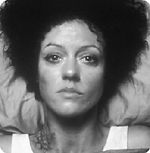TIMING IS EVERYTHING, especially when it comes to film festivals arriving in the movie doldrums of March. Most of the year-end prestige pictures of 1999 have finally reached Seattle—for better or worse—and the Oscar nominations have been given out (for better or worse). Traditionally, this is when Hollywood studios simply wait for the Academy Awards, ready their Oscar-related advertising campaigns, and dump their worst products on unsuspecting multiplexes (think What Planet Are You From?). For them, the money will start flooding in again with the Memorial Day start of action flick season; for us, for now, we should be grateful when any good, unheralded movies arrive in town (think Judy Berlin).
SEATTLE JEWISH FILM FESTIVAL
runs March 11-19 at City Centre
Now in its fifth year, the Seattle Jewish Film Festival swoops in, bringing us some pictures that otherwise wouldn’t reach the Northwest. For the uninitiated, the SJFF may conjure up visions of Fiddler on the Roof and Yentl, but its program of two dozen-plus films encompasses far more than mere nostalgia or feel-good ethnic affirmation. Some titles directly explore questions of Jewish history, identity, and faith, while others only tangentially reference those themes.
Set in Tel Aviv during the Gulf War, Yana’s Friends is a kind of updated screwball comedy dealing with the community of Russian immigrants—which includes director Arik Kaplun. He gives a fairly whimsical, colorful treatment to assimilation problems that might invite pathos, as Yana (his lovely wife Evelyn Kaplun) is abandoned by her on-screen husband and soon faces overtures from rakish Eli, a self-styled Romeo and wedding videographer. Meanwhile, other immigrants face a sometimes hostile Israeli society. “Go back to your own country,” one is told. But Yana largely succeeds in playing these conflicts for laughs, as it transforms the threat of Saddam’s nerve gas missiles into an opportunity for unlikely romance. It’s a small, engaging comedy.
The jokes take on a much narrower focus in Who’s the Caboose?, a very inside look at aspiring comics hoping for their break in Hollywood. Familiar faces from Comedy Central dot this largely improvised video mockumentary, making it most worthwhile for late-night channel surfers. Trailed by a film crew, young comedians Max and Susan forsake NYC for LA, initially deploring its phoniness, but quickly losing their bearings. “The money bought more purity,” Max declares.
MONEY BOUGHT something else for the Hollywood studio founders featured in Hollywoodism, a fascinating documentary based on Neal Gabler’s book An Empire of Their Own: How the Jews Invented Hollywood. It uses great movie clips, stock footage, newsreels, and commentary—including Gabler’s—to bear out his audacious thesis: that the studios were the true auteurs of their movies, which reflected not the directors’ personalities but the cultural memories of the Jewish studio bosses. Hollywoodism argues that those memories of schtetls and pogroms form “a hidden history” behind Westerns and other idealized movie genres.
Too many genres are at work in The Giraffe, which is part thriller, murder mystery, and romance, but it’s still fun to watch—like a page-turning airport novel. Director Dani Levy plays David, whose NYC family discovers unsettling links to the German Goldberg family of Lena (co-writer Maria Schrader, of Flirt and Am I Beautiful?). Identities are gradually revealed, then reconsidered, in its convoluted plot.
L顠Pool’s Set Me Free takes a more intelligent and restrained approach to identity, as 13-year-old Hannah copes with her parents’ troubled interfaith marriage and her own adolescence in 1963 Quebec. The coming-of-age themes are hardly original, but they’re handled in such a finely nuanced, evocative way that Pool’s relaxed pacing and largely interior drama holds your attention throughout. She also achieves remarkably deep, rich colors with her choice of film stock.
Other titles worth seeing include Kadosh, a sparse drama about two sisters’ yearnings and frustrations within ultraorthodox marital strictures, and The Life and Times of Hank Greenberg, an adulatory documentary about the baseball slugger of the ’30s and ’40s. Back when the spirit of John Rocker was prevalent in the big leagues, Greenberg refused to answer Jew-baiting and played long enough to welcome Jackie Robinson into the majors.
SJFF concludes with After the End of the World, which relates a twofold tale of Bulgaria’s vanished postwar ethnic harmony and lost childhood love, told in the present and flashbacks. Professor Cohen returns from Israel for a lecture in his family’s old village, encountering his childhood sweetheart—an Armenian who he thought had emigrated to France. With his photographer uncle, they recall the old life before Stalinist purges and labor camps, a bit too nostalgically but still affectingly. Yet even as the adult lovers rekindle their romance, After the End pointedly reminds us how the modern, post-Communist order also stomps on the past. “Don’t awake those dormant feelings,” gypsy singers warn—but the lovers can’t help it, as the past inevitably bleeds into the present.








